|
Limitar tu búsqueda
[+–] Editorial
[+–] Fecha
[+–] Formato
[+–] Idioma
[+–] Tipo de documento
[+–] Tipo de recurso
|

|
|
Evaluating rural electrification projects: methodological approaches
In recent years, the international community has expanded efforts in program evaluation to improve the accountability of development projects. This paper presents approaches to implementing state of the art evaluations in rural electrification projects, taking into account specific challenges that researchers face in such interventions. II suggests an approach to assess impacts before an...
|
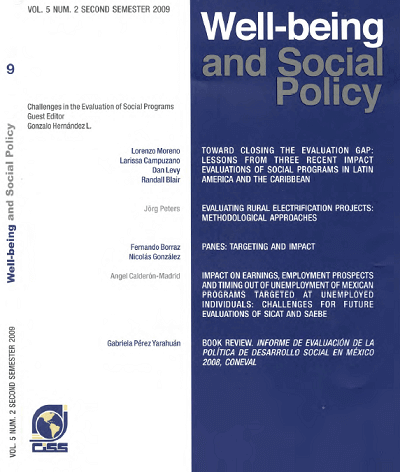
|
|
|
|

|
|
Toward closing the evaluation gap: lessons from three recent impact evaluations of social programs in Latin America and the Caribbean
Despite recent growing demand from funders and governments, rigorous impact evaluations in Latin America and the Caribbean remain the exception rather than the rule. Many commissioned impact evaluations are methodologically weak, and thus only marginally useful in assessing the impact of social interventions. Other impact evaluations feature strong research methodologies at their conception, but...
|
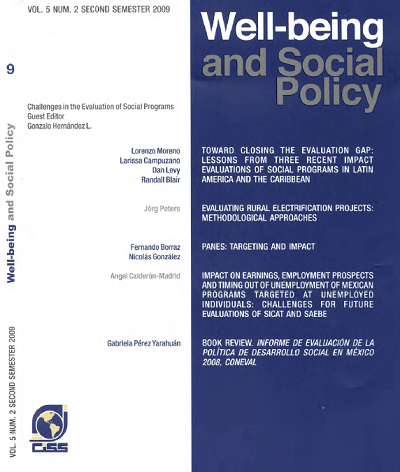
|
|
|
|

|
|
Book review. The economics of microfinance, by Beatriz Armendáriz de Aghion and Jonathan Morduch
The book by Armendáriz and Morduch focuses on how microfinance institutions work, what has been their impact and whether they are financially sustainable. For such purpose the book can be divided—from my viewpoint—into six sections. The first describes the environment of imperfect information that surrounds credit transactions and the consequences that this entails. First the authors define in a...
|
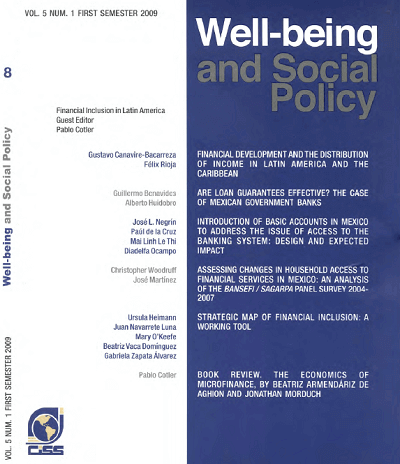
|
|
|
|

|
|
Strategic map of financial inclusion: a working tool
Various circumstances make difficult the rigorous study of processes, strategies and impact of V the efforts of financial inclusion and penetration, either at the academie level, in the public policy area or in companies and organizations of financial services industry. The central problem in Mexico has been the lack of a unified agreement on the definition and the low comprehension level of the...
|
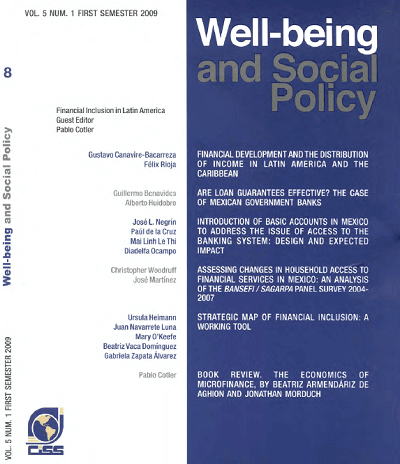
|
|
|
|

|
|
Do investments in public spaces generate social capital? Evidence for Mexico
The formation of social capital is critical for developing countries. This paper investigates the effects of attempts to recover public spaces in marginalized areas of Mexico. The effects are estimated through balancing in the propensity scores. We focus on the results of perception of safety, support and social capital. When efforts are made to recover public spaces, the perception of safety...
|
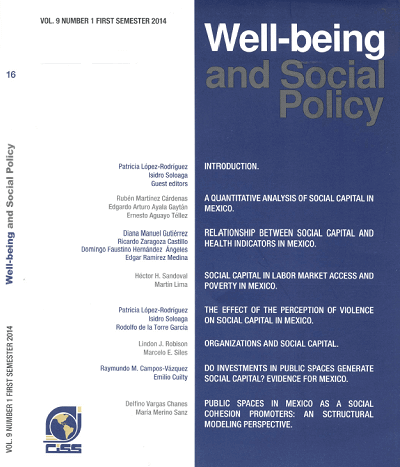
|
|
|
|

|
|
Assessing changes in household access to financial services in Mexico: an analysis of the BANSEFI/SAGARPA panel survey 2004-2007
In March 2004, BANSEFI and SAGARPA began a project to examine the impact on households I of the Program to Strengthen the Popular Credit and Savings Sector (Programa de Fortalecimiento del Sector de Ahorro y Crédito Popular), which was designed to help non-bank financial intermediaries to abide by the Ley de Ahorro y Crédito Popular (LACP), passed by the Mexican Congress in 2001. During the...
|
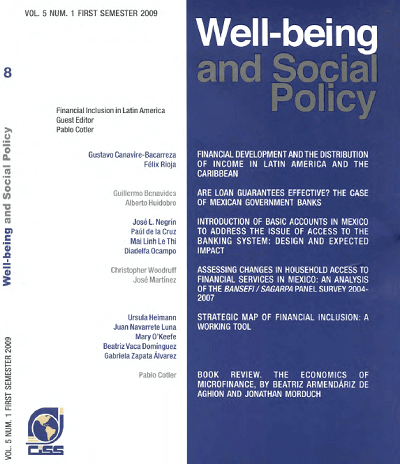
|
|
|
|

|
|
Introduction of basic accounts in Mexico to address the issue of access to the banking system: design and expected impact
This article presents the Mexican experience with the introduction of basic transaction accounts. Basic accounts are relatively cheap simple banking products with restricted functionality targeted at social groups that have limited access to transaction accounts. In Mexico, basic payroll accounts and accounts for the general public were introduced. By law, these products must be offered by all...
|
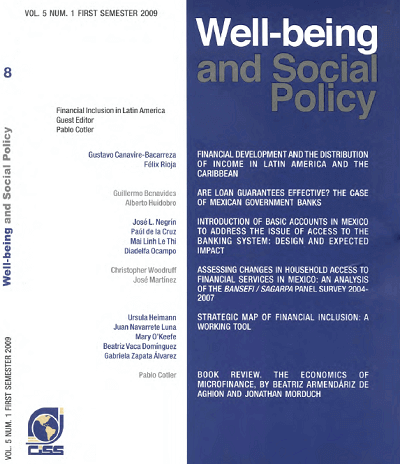
|
|
|
|

|
|
Financial development and the distribution of income in Latina America and the Caribbean
One of the central concerns in Latin America an the Caribbean (LAC) has been the reduction of poverty and inequality so prevalent in the continent. Using large world samples, the literature has found that financial development increases economic growth, increases the income of the poor, and reduces inequality. This paper studies the effects of financial development on the whole distribution of...
|
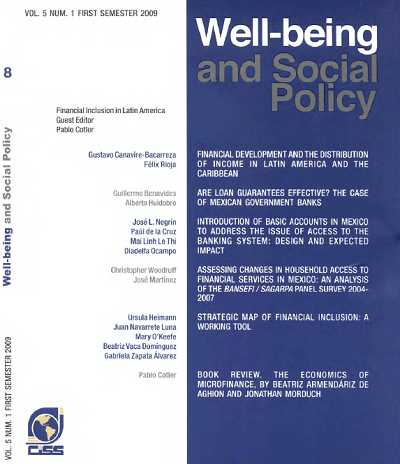
|
|
|
|

|
|
Book review. Informe de evaluación de la política de desarrollo social en México 2008, CONEVAL
The Evaluation Report on Social Development Policy in Mexico was published by the National Council for Social Development Policy Evaluation (CONEVAL) in 2008. The Council is one of the constituting elements of the new institutional framework to evaluate the public sector performance, particularly social development policies that were put in place mostly during the first decade of this century....
|
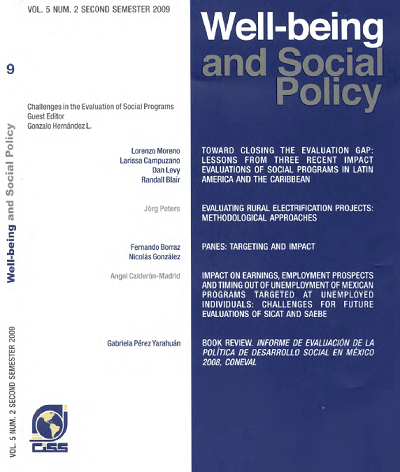
|
|
|
|

|
|
Public spaces in Mexico as social cohesion promoters: an structural modeling perspective
This research assessed the effects of several contextual factors (e.g, neighborhood insecurity, evaluation of public spaces, infrastructure, low risk behaviors) on social cohesion and residential satisfaction, in the context of low and medium-low socio economic status of individuals nearby renovated public spaces (parks and recreational facilities) in Mexico. The research method is based on...
|
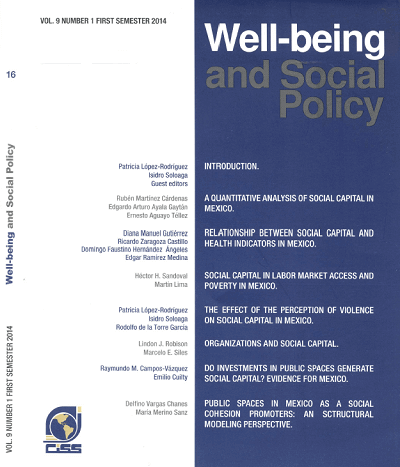
|
|
|
|

|
|
Seguridad social en América Latina: evolución, reformas recientes y perspectivas
El presente documento brinda un análisis general de los modelos de aseguramiento social en sentido amplio y, posteriormente, se concentra específicamente en los sistemas de aseguramiento social en salud. Discute la relación entre resultados de cobertura, niveles de gasto, riqueza y distribución, la organización de los sistemas sanitarios y de pensiones, y el desarrollo de mecanismos no...
|

|
|
|
|

|
|
Migración laboral: retos y oportunidades para la protección social
La migración internacional se ha establecido como un fenómeno normal en las sociedades contemporáneas, pero se mantiene una gran deficiencia en la cobertura de la seguridad social hacia los migrantes internacionales. Las cifras de flujos anuales de migración se han estabilizado después de la disminución que ocurrió a partir de la recesión económica de 2007-2009, y hay un acervo grande de familias...
|

|
|
|
|

|
|
Book review. Empleo, trabajo y desigualdades en salud: una visión global. Joan Benach, Charles Muntaner, Orielle Solar, Vilma Santana y Michael Quinlan
This is a stimulating book which explores the relationship between employment conditions and health outcomes. The authors provide a conceptual framework to illustrate the channels through which health outcomes are determined and affected; this framework includes individual and aggregate variables, such as the economic, political and environmental conditions. The book also includes case studies...
|
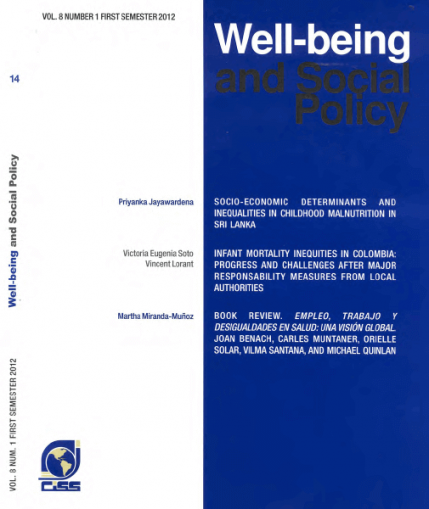
|
|
|
|

|
|
Infantil mortality inequities in Colombia: Progress and challenges after major responsability measures from local authorities
This paper aims to analyse the space and time distribution of the infant mortality rate (IMR) at municipality level in Colombia before and after conferring greater responsibilities to the municipalities for the administration of the local health care systems. Using special econometrics, we find that there is a geographical concentration of IMR persisting over time and defining two groups of...
|
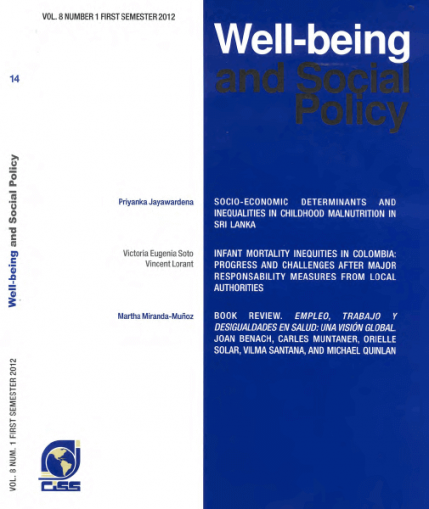
|
|
|
|

|
|
Socio-economic determinants and inequalities in childhood malnutrition in Sri Lanka
Despite countless initiatives to alleviate malnutrition over the years, it affects hundreds of thousands of children in Sri Lanka. Understanding the determinants of malnutrition and their contribution to socio-economic inequality in malnutrition is essential in targeting specific socio-economic groups to improve their nutrition levels. This study attempts to identify the socio-economic...
|
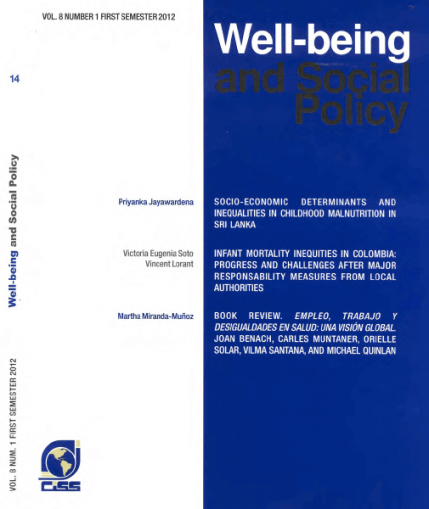
|
|
|
|

|
|
Social security pensions and retirement decisions in Mexico
Using Mexican cohort data for 1991-2000 this article examines the relationship between retirement decisions —the transition from work to labor market inactivity— and social security (contributive) pensions in less developed countries. The available large time series also makes possible to examine how a financial crisis that took place in 1995 has affected retirement incentives. In most Latin...
|
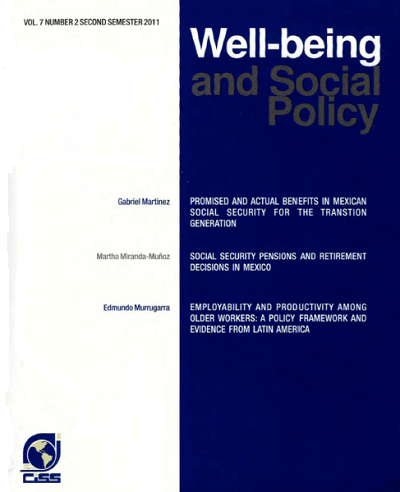
|
|
|
|

|
|
Promised and actual benefits in mexican social security fot rhe transtion generation
Este artículo presenta un conjunto de mediciones de los costos y beneficios reales del plan general de retiro por jubilación proporcionado a los ciudadanos por parte del Sistema Mexicano de Pensiones (SMP), que son necesarias para evaluar las decisiones de los trabajadores en cuanto a la contribución a la seguridad social (es decir, trabajar en el sector formal) y al retiro. El SMP ofrece dos...
|
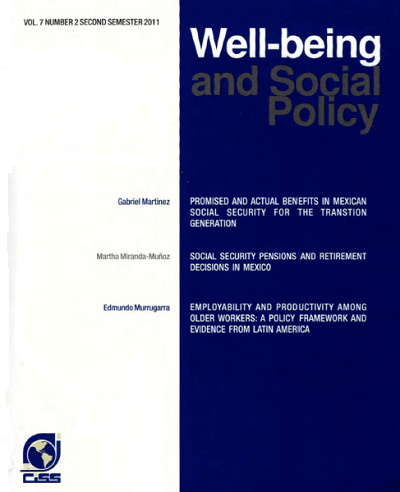
|
|
|
|

|
|
Impact on earning, employment prospects and timing out of unemployment of mexican programs targeted at unemployed individuals: challenges
his paper presents estimates of the impact of programs for unemployed workers on the performance of program beneficiaries in Mexico. We emphasize the significance of applying methodologies capable of avoiding statistical bias attributable to unobserved variables when measuring the impact on earnings and allowing to us properly estimate unemployment duration and work status after exiting from...
|
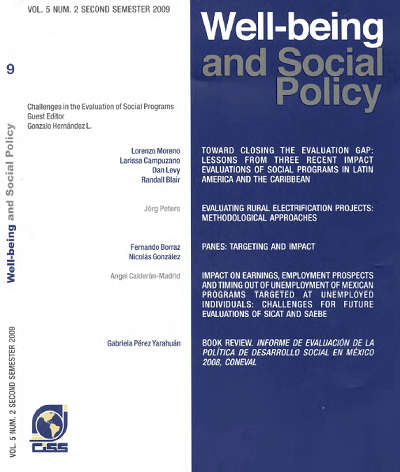
|
|
|
|

|
|
Natural disasters and poverty in Latin America: welfare impacts and social protection solutions
The Inter-American Conference on Social Security (CISS) and the United Nations Development Programme (UNDP) Office in Mexico jointly organized the conference “Natural Disasters in Latin America: Welfare Impacts and Social Protection Solutions” held in Mexico City in January 2010. The main objectives of the conference were to improve the understanding of (i) how natural disasters affect...
|
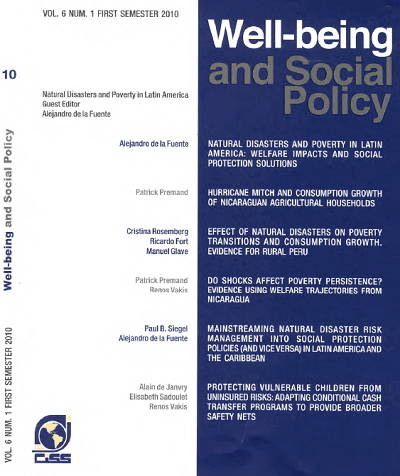
|
|
|
|

|
|
Introduction (On the issue of social capital that is addressed in this issue of the journal)
In recent decades, interest has increased in identifying, estimating and linking social capital to a variety of well-being variables in which the production of certain benefits or performance is key. Research has involved the confluence of several disciplines: economics, sociology, anthropology and psychology, to name a few. Although consensus on the definition of a single indicator for measuring...
|
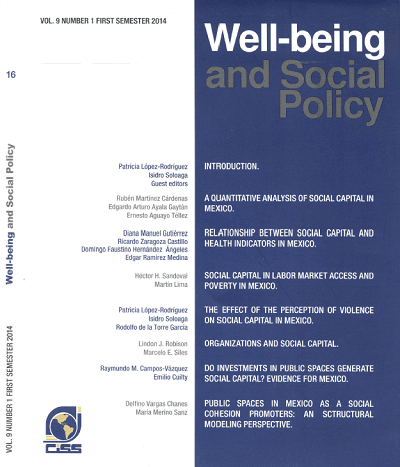
|
|
|
|
|